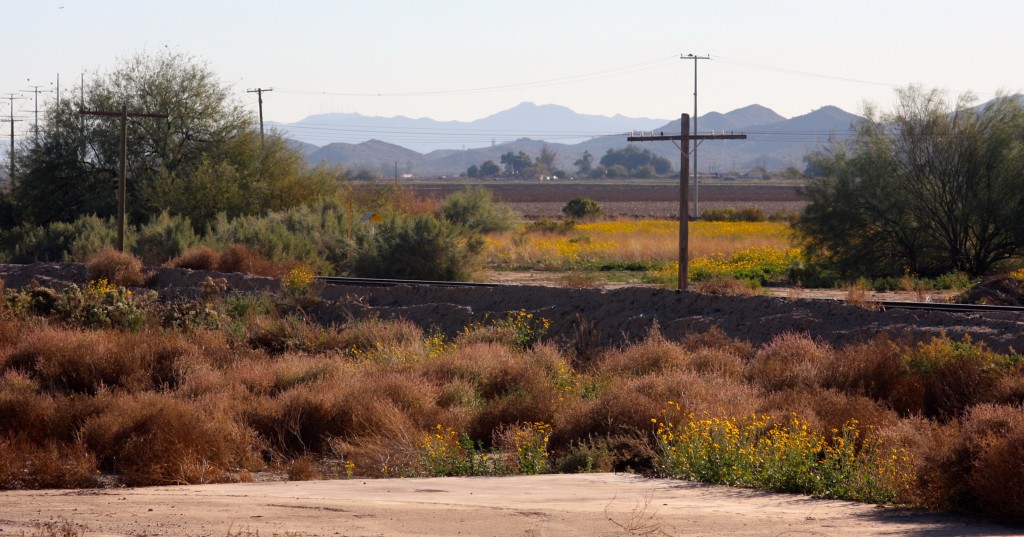Holiday Dread: The Desert
Celebrating togetherness in the scorching heat.

When I think of The Holidays, here is what I picture: lying in the back seat of my family’s minivan, headphones jammed in my ears, counting the telephone poles between Los Angeles and somewhere hotter and stupider and even more boring. When I was a kid — when she was alive — we did Thanksgiving and Christmas at my Catholic grandmother’s house, which was located in a planned community half an hour outside of Phoenix, a very standard-looking suburb dropped, thunk, in the middle of an empty desert.
We stopped on the way in or out of town at my Jewish uncle’s house in Palm Springs. That was kind of lovely, actually: Larry is a teamster and an eBay antiques dealer, a man with a commercial class A driver’s license and an aesthete’s eye for beautiful, delicate things, mostly made of silver and glass. I mean Palm Springs was boring and horrible too but at least we didn’t have to be there for long, usually, and my uncle and his friends weren’t very interested in kids, which suited me just fine. I could sit on his plush leather couch and admire my reflection in the mirrored coffee table and read all afternoon.
But then there was Phoenix. Some of it was just standard family drama: alcohol, old resentments, arguments that blossomed into full-scale fights, because everyone I’m related to has a temper. Mostly, though, it was the quiet that unsettled me. It gets cold in the desert in the winter, the kind of cold where the sun can be too hot on your skin but the hollows of your ears burn when you try to take a walk. The air is too empty to hold onto temperature. The silence and the stillness of it felt present, and threatening: circling a man-made lake and watching the golden sun slide through the perpetually flat blue of the sky. You could see the moon all day. Nothing in the world was where it was supposed to be.
I mean, there was a more general feeling of displacement of course. I was a Jew on Christmas. I was a Jew on Christmas in the desert. It’s not that I wanted any of the trappings I saw on TV — snow or whatever. I did like the resort we stayed in, a place resonant with white people’s nostalgia for native culture and the cowboy days of the southwest. But there, that was another displacement: lying on a chaise lounge and slathering my fishbelly skin with SPF 70 at a hotel called The Wigwam.
It just felt like I didn’t belong anywhere, like none of the places I found myself were really supposed to exist. The whole country was celebrating togetherness and northern winter coziness while I squinted through sunglasses, read a magazine, cut across a golf course on my way to the store. We would stop on the way home in a town called Quartzite, a row of trailers on either side of a wide street just before the California border, so that my dad could buy shards of meteorite and pulled pork sandwiches. Some years he got food poisoning but some he didn’t.
This is what I think of, when I think of The Holidays: orange trees with their trunks painted white against the scorch of the sun, and wrapped in red velveteen ribbons to make them look festive. The time my little brother fell off his bike on a gravel path and scratched himself up so badly that he and my parents spent the whole of Christmas eve in the ER.
I had declined to go biking. Instead I sat in our hotel room in a robe and ordered room service and pay-per-view, and I thought that this was what it should be, that everyone should celebrate this way: by making your own world, a place that was insular and small and safe, where you were the only person — except, of course, for the people who made my dinner, and did my dishes. I wrapped myself up against the clear, deep dark outside and drowned out the noise in my head by falling asleep with the TV on.
Zan Romanoff’s first novel, A SONG TO TAKE THE WORLD APART, was published by Knopf in September. She lives and writes in LA.
Holiday Dread is The Awl’s series dedicated to the season of joy and other emotions. Previously:
